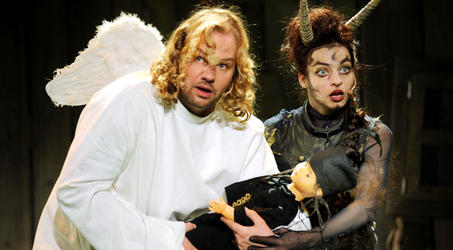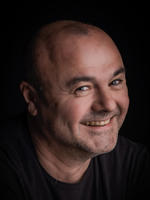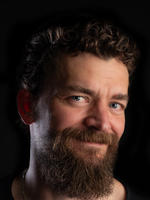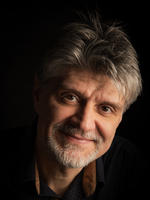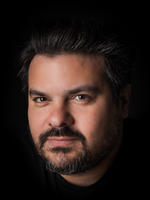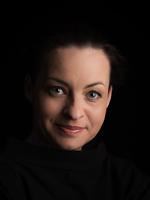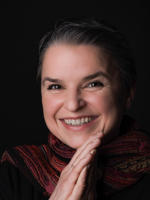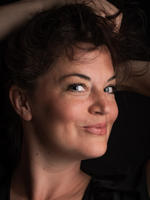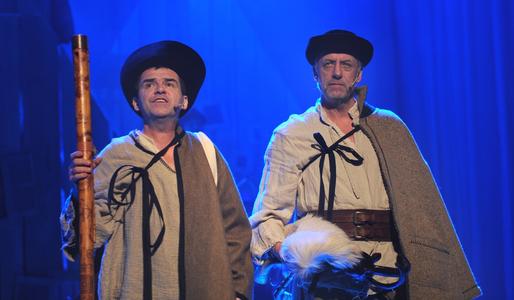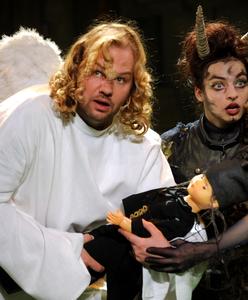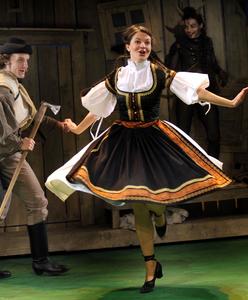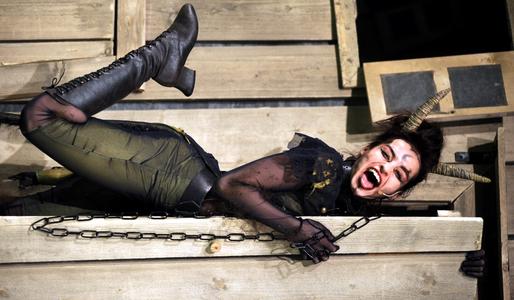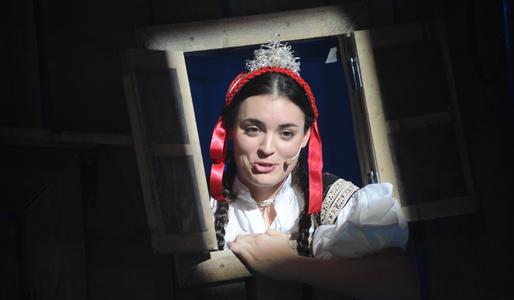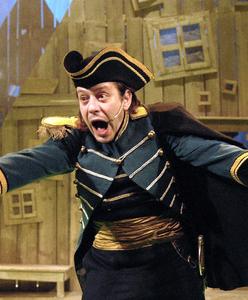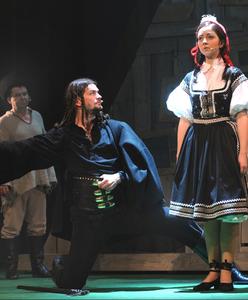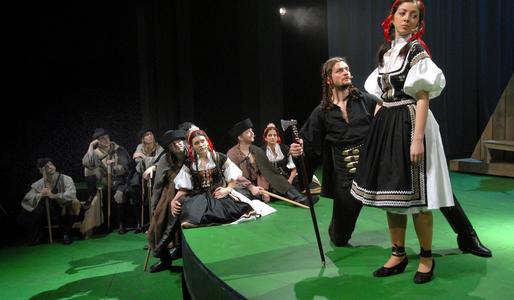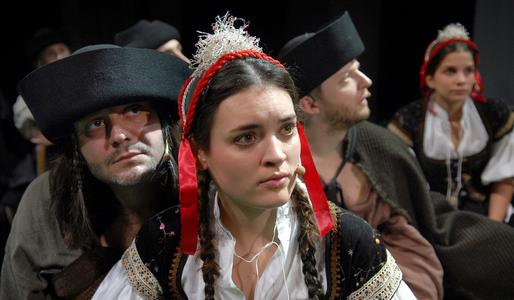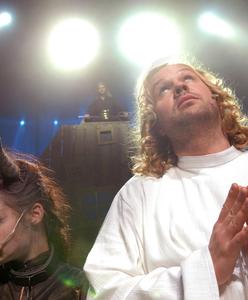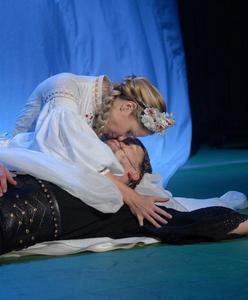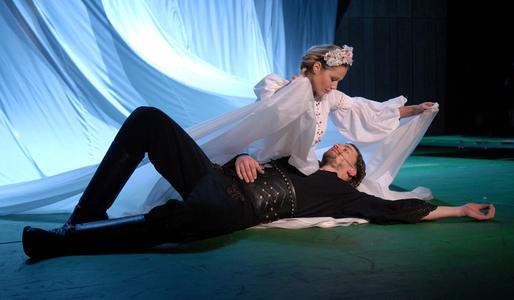Jánošík as a jazz-rock folk musical
Vladimír Čech 1. May 2008 zdroj Kam - supplement No. 5
In this musical style and under the title Jánošík, or Painted on Glass, this work is being performed by Brno City Theatre as the directorial debut of their actor Stanislav Slovák, from a translation by dramaturgist Jan Šotkovský. There's no cimbal music anywhere to be seen; the basic band is made up of two guitars, two keyboards, two percussions and a bass guitar, with these rock instruments being spiced up by a violin, a violoncello, a flute, a piccolo, a clarinet and a tenor saxophone. The producer for music (Karel Cón) intended the musical aspect of the performance to come as close as possible to the rock spirit of the original Polish LP record, on which famous Polish stars such as Czeslaw Niemen and Maryla Rodowicz sang songs from the musical.
The actors of the individual roles show their abilities with obvious experience and enthusiasm, as seems to be the rule for this ensemble. For all of them, let's mention at least the demonic (in a bandit-like way) and masculinely charismatic Dušan Vitázek in the role of Jánošík, who is an ideal embodiment of this legendary Slovak-Polish character.
A Slovak legend comes to life in Brno
Jana Svozilová 1. April 2008 zdroj Kult
At Brno City Theatre on the first day of March, a popular and successful member of the musical ensemble, Stanislav Slovák, celebrated his directorial debut. Under his direction a pleasing folk spectacle has been created which presents the Slovak-Polish legend of Juraj Jánošík - Jánošík, or Painted on Glass.
The musical by the librettist Ernest Bryll is supplemented by Katarzyna Gärtner's music, which is most pleasant to the ear. The musical arrangement was carried out by Karel Cón who is, together with Karel Albrecht, the conductor of the performance. Even though the author of the music was influenced by Polish musical folklore, the whole production is more of the "rock musical" kind and puts the spectators into a good mood with its pleasantly amenable temperament and humor. The authorial tandem has thus elegantly avoided the insipidness and nostalgia that can accompany depictions of the bandit's life story.
Jaroslav Milfajt took part in the production of the performance, and it is thanks to him that the simple, functional set was created using mainly the front part of the stage and the forestage. The costumes, which are truly 'in the folklore spirit', were designed by a leading costume designer at the theatre, Andrea Kučerová, who kept to the style of the classic version and created folk costumes and distinct soldier's uniforms.
The choreography, which subtly stresses the comic nature of the jazz-rock musical in its unusual execution, is the work of Hana Kratochvilová-Josefiová. The whole production experience is completed with light effects and good sound design. The performance, which has a slightly ironic tone, is conceived as "a theatre within the theatre" to a certain degree. The spectators see a whole stream of bandits, soldiers and love-hungry flirtatious girls up on stage.
As far as the cast is concerned, Juraj Jánošík is played by Dušan Vitázek, whose definite advantage is undoubtedly his absolutely great singing skills. Jánošík is accompanied from birth, throughout his whole life and the love problems that plague it, and right up until his death by a cheeky devil and a kind angel. The burlesque, sexy devil was played by Radka Coufalová in alternation with Mária Lalková. In the role of the peace-loving angel spectators can see Petr Gazdík or Petr Šmiřák.
The life story of Juraj Jánošík, who was not successful in gaining the love of women, ends with the only possible conclusion. The one and only "woman" in his life becomes beautiful Death, performed by Pavla Vitázková or Eva Jedličková, and this 'arrangement' symbolizes the fulfillment of the relationship between a man and a woman - the birth of a child. Juraj Jánošík dies in the arms of Death, who is clad in a white dress and expecting a baby. Visit Brno City Theatre and see this pleasantly light performance - it will certainly put you in a good mood.
Painted on Glass
Vladimír Čech 26. March 2008 zdroj Hospodářské noviny
Two versions of the Bandit's musical are being put on in Brno
This month there's banditry galore in two Brno theatres: the Radost puppet theatre and Brno City Theatre are putting on differing versions of the already 40 years old classic Polish musical Painted on Glass by librettist Ernest Brill and composer Katarzyna Gärtner.
Jánošík, jazz rock-style
In jazz rock-style and under the title Jánošík, or Painted on Glass, this work is being performed by Brno City Theatre as the directorial debut of their actor Stanislav Slovák and translated by dramaturge Jan Šotkovský.
There's no cimbalom music anywhere to be seen; the basic band is made up of two guitars, two keyboards, two percussion instruments, a bass guitar, a violin, a violoncello, a flute and a saxophone. The creators intended the musical aspect of the performance to come as close as possible to the rock spirit of the original Polish LP, on which famous Polish stars such as Czeslaw Niemen and Maryla Rodowicz sang songs from the musical.
Slovák's version isn't as playful as Pešek's, even though it still isn't lacking in humour. This time Jánošík is not immortal, so the ending is somewhat meditative in form.
The skilled solo singers make the most of the well-known melodies, and the bewitchingly charismatic Dušan Vitázek in the role of Jánošík is perhaps the ideal embodiment of the Slovak-Polish myth.
... Jánošík whistled...
Miloš Hudec 20. March 2008 zdroj Echo
The Jánošík legend has already ruled in Czech theatres for many years. Since 1972, when it appeared on the stage of what used to be known as the State Theatre (Zbojníci a žandáři - 'Cops and Robbers' - directed by Pavel Hradil), there have been a total of 26 Czech theatre productions, and it has been performed many times on the stages of amateur ensembles.
Jánošík was and still remains a jewel of a Slovak, a person who is the closest to the Czechs, brother-like, free, and easy to understand.
On 1st March, two Brno theatres (the Radost puppet theatre and Brno City Theatre) held premieres featuring the topic of Jánošík, and they both managed to fill their auditoriums up to the very last seat.
It wasn't really about Jánošík as the hero of balladic tales and heroic deeds, but mainly about a Jánošík who loved and lived a full life at the turn of the eighteenth century. A man who was first a strong character in folklore, and today - interestingly - is being referenced by the Slovak Prime Minister, Fico.
At Brno City Theatre's Music Theatre, the director Stanislav Slovák staged "Jánošík, or Painted on Glass" according to the Polish authors Ernest Bryll and Katarzyna Gärtner, and translated by Jan Šotkovský. The audience was surprised by the completely new "Polish" attitude to the topic. The patriotic and social pathos; the main focus was on Jánošík - the person. Also, the conception of the work - as a jazz-rock musical - was completely new and original. I had expected a traditional conception from the domain of allusive folklore, but as it appeared - there was neither a cimbalom nor other traditional folk music instruments in sight.
I have to admit that I found the new jazz-rock version attractive, and the musical has also generally been appreciated by the public. Solid proof of this can be found in the many curtain calls and excited ovations. It couldn't have been any other way - Moša's theatre sent their most powerful warriors into battle. The development of music for the production was led by Karel Cón, the setting in the style of "wooden forest buildings" was executed by Jaroslav Milfajt, and the costumes were by Andrea Kučerová. The stylish choreography by Hana Kratochvilová-Josefiová also deserves admiration.
The cast was also chosen strategically. Dušan Vitázek, as if demonstrating his Slovak roots in the role of Jánošík, and his dear Hana Holišová excelled through her natural charm. Both of those guiding you through the plot, Zdeněk Junák and Erik Pardus, added to the pleasant atmosphere with their folk humour. Similarly successful were also the 'supernatural' guides Petr Gazdík and Radka Coufalová. Those playing in lesser roles also deserve the highest praise.
In this production there are a great many very demanding singing parts. I think that if this performance were put on by actors from Prague then our mass media would truly have something to broadcast!
To conclude, let's just say that Moša's theatrical collective has once again presented Brno with a theatrical performance of the highest quality.
Ernest Bryll, Katarzyna Gärtnerová: Jánošík or Painted on Glass
David Kroča 5. March 2008 zdroj Review for Czech Broadcasting 3 Vltava
Brno City Theatre, Music Theatre, premiere on 1st March 2008
The famous Polish musical, Painted on Glass, usually gets a 'folklore' treatment in Moravian theatres, in which one's eyes are attracted by folk costumes and one's ears are pleased by cimbalom and violin melodies. Brno City Theatre, however, has gone for a jazz-rock musical style, the beat-heavy arrangement of which sits easily alongside classic rock opera titles of the Jesus Christ Superstar type.
Also, the new translation by Jan Šotkovský is more rational and epic than is usual, and he admits being inspired by top translations of the past, particularly by the Slovak translation by Emílie Štercová. Šotkovský chose to use short, mostly only brief comments for the two narrators of the story, Opovědník and Dopovědník; he uses harsh expressions and allows the poetry of the original to shine through mainly in the touching song texts. In fact, the director himself, Stanislav Slovák, also approaches the original without any falsity or sentiment. From the beginning, he leads the actors in a humorous, in places almost parodic approach to the characters, and lets them show off in order to bring their creations ironically back down to earth. What is a little objectionable about his first directorial effort is his caution. He doesn’t let his actor colleagues experiment, and during moments in the performance when they might possibly become short of breath, he lets them sing statically on the forestage. The debut of the choreographer Hana Kratochvilová was successful: the dance scenes are well thought out, being derived from the actor's actions themselves, and the original pair dance in particular affects the audience with strong emotions.
Most of all, spectators will probably remember the artistic layout of the performance. The scenographer Jaroslav Milfajt filled the stage with wooden pyramids which represent little houses with irregularly placed windows - they look like the tops of wild mountains from distance. The acting space was made wider by using the orchestra space as a place where the actors who are momentarily not acting view the theatre as spectators - like at a theatre within the theatre. And so where is the orchestra? This is a little mystery for the spectators from the beginning, and it is only solved as late as in the impressive finale. The director has the stage completely cleared and covered only by a white veil to personify death, which is just approaching the hero. With the last rhythms of the musical, the shadows of the musicians start appearing gradually from behind the veil until it falls down completely and you can see the orchestra playing in the background. It is as if the director has unveiled the cards with which he was playing all the time right at this moment: it isn't just a matter of the creation of a theatrical illusion, but also the recognition of the execution in concert of a great musical piece.
The overall impression from the premiere performances of the actors also supports this conception. Even though the folk theatre characters are nice, including the eccentric devil performed by Radka Coufalová or Petr Gazdík's sweet angel, the premiere was successful mainly due to two actors: Dušan Vitázek in the role of Jánošík, and Hana Holišová in the role of the First Girl. Vitázek's titular hero is a hard man from the mountains who controls hell as well as heaven and who accompanies every solo that's sung with vocal equilibristics. Hana Holišová as Jánošík's lover also shows herself to be an accomplished singer. She sings with concentration, purity and with an impressive tension that culminates in her final song 'When the bandit was dying'.
The performance of Jánošík, or Painted on Glass at Brno City Theatre will certainly claim the spectator's attention. Its strong points are the humorous stylizations of folk theatre but also the excellently performed jazz-rock numbers which certainly suit the harsh story of the legendary bandit.
The spectators greeted the performance with enthusiasm
J. G. Parma 1. March 2008 zdroj Kultura, No. 3
A successful premiere not only for the well-known musical "Jánošík or Painted on Glass", but also for the director
For the eighth time this season, Brno City Theatre invited its spectators for a premiere, this time of the jazz-rock folk musical "Jánošík or Painted on Glass", the authors of which are Poles, the poet Ernest Bryll and the composer Katarzyna Gärtner. The performance is the first independent directorial work of one actor of the ensemble, Stanislav Slovák, who started to appear as an assistant director from the year 2003 and who also studies this specialization at the Janáček Academy of Music and Performing Arts.
It can be said that this musical is not new for Brno, as it was performed here in the then Czechoslovakia for the first time. However, this was on 28. 9. 1972 when it was performed by the Brno State Theatre, directed by Pavel Hradil under the title " Zbojníci a žandáři " (Cops and Robbers). It hadn't been seen in the city ever since… until now. Maybe you'll find it interesting that there were as many as two premieres of it in the same city on the same day, though at different times. The one we are talking about, and also an "afternoon" one at the Radost Puppet theatre (Painted on Glass, director Vlastimil Peška). Of course, the Brno City Theatre production has one more primacy. In their Czech premiere, it is performed in a completely new translation by Jan Šotkovský, also a dramaturgist, with whom Stano Slovák also took part in the alterations of the text. (Apart from this, Jan Šotkovský is also the author of many interesting articles in the again comprehensive programme).
Theatre is aimed mainly at an audience, so let's look at their first, immediate reaction after the premiere on 1st March (the 633rd in the history of the theatre, in total). The performance was greeted with great enthusiasm; it was non-stationary and full of action. The set by Jaroslav Milfajt, who has already become a traditional author of stage settings, was also attractive, as well as the inventive choreography by Hana Kratochvilová-Josefiová, and the costumes by another of the permanent creators of the ensemble, Andrea Kučerová.
The title of the play itself could be misleading in the musical area. Perhaps it could lead you to the idea that it is something from folklore, which would probably suit the character of Jánošík. However, the author of the music has a different "point of view". She started her musical career as a jazz pianist, writing over 400 songs which were released on 120 records. Among the most popular is Malgoška, written for Maryla Rodowiczova, in our country known more as Markétka, sung by Marie Rottrová or Helena Vondráčková with the original name. K. Gärtner has become well known, for (among other things) her "beat" mass The Lord Is Your Friend. The musical style of this musical corresponds to the composer's orientation, and its songs were released on LP even before the musical was played on stage.
Karel Cón was in charge of the musical production (he also alternates with Karel Albrecht behind the conductor's stand) and he agreed with the director that he would try to get as close as possible to the rock version of the original Polish LP. That's why the core of the present stage production is a rock band, with the addition of a violin, violoncello, flute and saxophone. As one of the younger yet musically competent spectators pointed out, it must have been a real musical venture at the time of its creation in the year 1970.
As has been said before, the whole performance is lively, which is certainly thanks to the direction and but mainly thanks to the actors. All deserve great recognition, whether it be Zdeněk Junák or Erik Pardus (Opovědník, or Dopovědník), Dušan Vitázek (Jánošík), Petr Gazdík (Anděl) or Radka Coufalová (Devil). In the role of the Shepherd you could see Pavel Kunert, and Death was played by Pavla Vitázková (her dance with Jánošík was one of the real peaks of the performance) - the audience also appreciated Lukáš Vlček (the soldier Strašpytel), Jan Apolenář (the head of the soldiers) and others who took part as soldiers, bandits or girls. Hana Holišová in the role of the First Girl was a very pleasant surprise, both with her singing and dancing.
It is obvious that the author Ernest Bryll is mainly a poet. It might be surprising that his play is not a biographical cross-section of a popular Slovak character. He explains his attitude by saying that he "didn't want to make a museum of folk customs." He likes to remember all his productions shown in Czechoslovakia, mainly the Bratislava one which had 647 repeats at the Slovak National Theatre, with Michal Dočolomanský in the main role.
Jánošík has won over its audiences and it seems that Brno City Theatre has also gained another capable, original director. This is good news. To conclude, I would like to return to the author and his foresight. 38 years ago, Jánošík uttered words which are related to the end of the musical but which have a general validity in many places: "Quiet! What you say here is not true. Only rubbish and lot of hot air." Is it not the case today?

